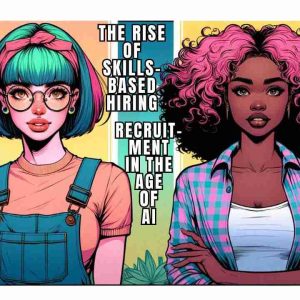The New Era of Tech Employment – Adapting to AI

The new job market looks like a circus. AI has significantly and profoundly impacted all types of tech employment. Traditional IT roles are rapidly changing, salary expectations are adjusting, and the demand for AI-specific skills is surging. This shift is not just a fleeting trend but a fundamental change that could redefine the trajectory of tech careers. “You Lost Your Job. Now What? Surviving the AI Shift” can help you navigate all the changes. But, before we talk about that…
The New Tech Employment Reality
In the new IT job market, it’s evident that professionals without AI skills face significant challenges. According to The Wall Street Journal, the U.S. IT sector is anticipated to shrink further, with an estimated reduction of 20,000 to 30,000 jobs in 2024 alone, as AI continues to automate tasks traditionally performed by humans. The unemployment rate for IT professionals currently sits at 4.3%, slightly above the overall U.S. rate of 3.9%. This increase underscores a growing mismatch between the skills job seekers possess and what employers now demand, particularly in AI.
Professionals who previously enjoyed high salaries and a robust demand for their skills find themselves in unfamiliar territory. Those laid off are not finding new roles as quickly as before due to this skill gap and altered salary expectations. Companies are reassessing their needs and costs, leading to a significant decrease in traditional IT roles such as telecommunications and corporate systems management while simultaneously increasing demand for cybersecurity, AI, and data science specialists.
The AI Shift To LLMs
According to TWSJ, this shift towards AI and automation is not merely a phase but a fundamental change in how businesses operate and what they expect from their IT workforce. Generative AI skills, particularly those related to large language models like ChatGPT, are now at the forefront of technology priorities for many organizations. This new demand has catapulted the average salary potential for positions requiring generative AI skills to $174,727, a stark contrast to declining wages in other tech domains.
For IT professionals and job seekers, this new reality underscores the necessity of adapting and acquiring relevant AI skills to remain competitive and valuable in the job market. However, navigating this shift can be daunting, especially for those who have recently lost their jobs or are unfamiliar with AI technologies.
What To Do?
“You Lost Your Job. Now What? Surviving the AI Shift” offers a step-by-step guide to updating your resume, crafting tailored cover letters, prepping for interviews and understanding how AI is reshaping hiring practices. It’s crucial to understand what this means for your job search and career development. It’s also paramount to acquire AI-related skills and learn to harness the power of AI tools to enhance your job prospects.
Embrace the Change
As tech employment opportunities continue to evolve, embracing AI and integrating it into your skillset is no longer optional but essential. For those navigating the uncertain waters of the AI-affected job market, this book serves as a lifeline, offering strategies to turn obstacles into opportunities. It is a testament to the power of resilience, adaptability, and proactive learning in the face of technological advancements and market shifts.






